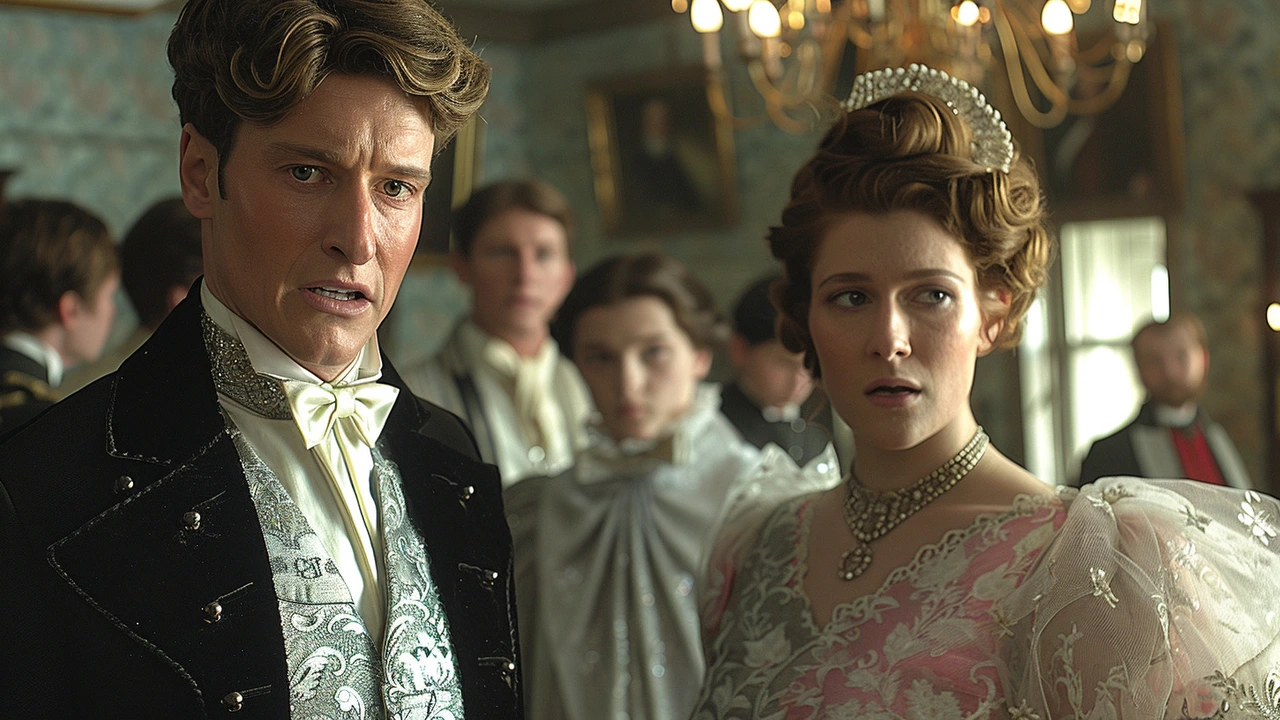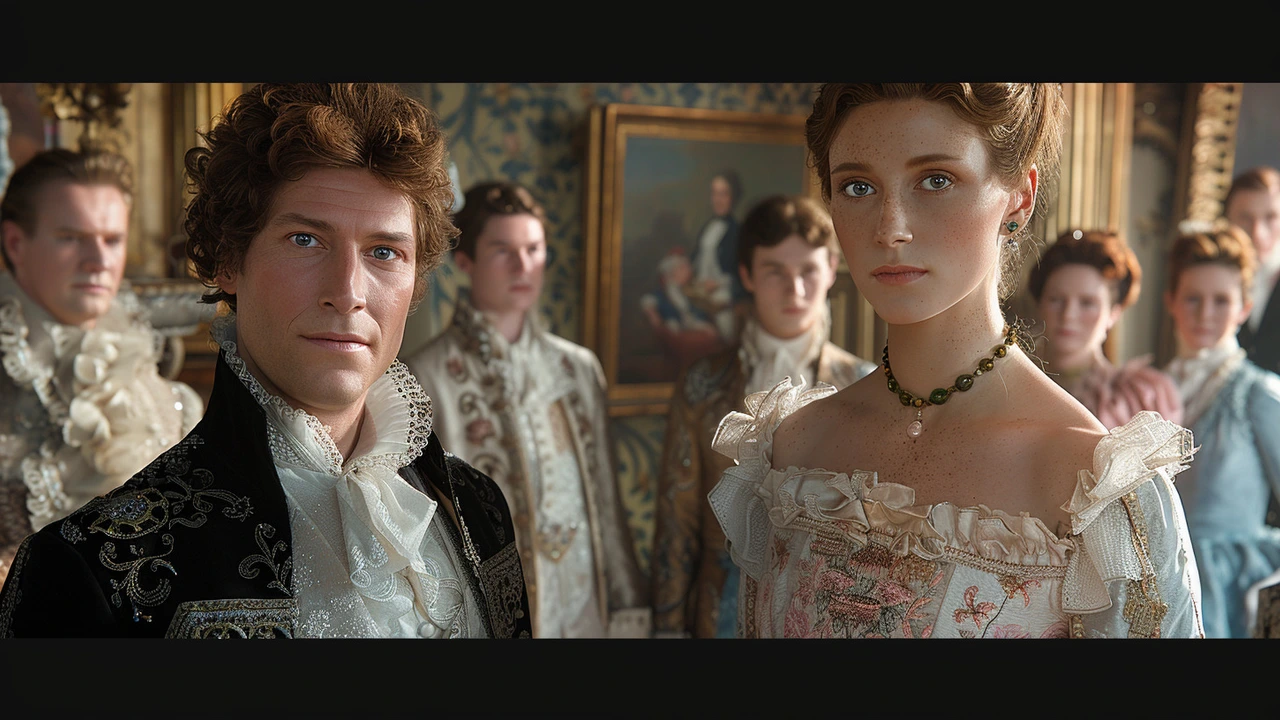
The Bold New Directions of Bridgerton’s Third Season
The Regency-era world of 'Bridgerton' has always been celebrated for its daring portrayal of romance. With its intricate storylines and opulent visuals, it has captivated audiences since its debut on Netflix. Now, with the introduction of queer relationships in its third season, 'Bridgerton' is making history. This season, the focus shifts to Benedict and Francesca Bridgerton, two siblings whose romantic journeys break away from the heteronormative romances of previous installments.
Benedict Bridgerton’s Unconventional Romantic Journey
Benedict Bridgerton, portrayed by the talented Luke Thompson, showcases a new aspect of the aristocratic world. Initially portrayed as a free spirit in earlier seasons, Benedict finds himself drawn into a complicated relationship. His romance with Tilley Arnold, played by Hannah New, brings freshness and intrigue to the show. The dynamic between Benedict and Tilley highlights the struggles and triumphs of navigating relationships that defy societal norms.
The allure of Benedict's character is his willingness to challenge the expectations of his time. In an era where marriages were often about securing social status, Benedict's more carefree and explorative nature stands out. However, his hesitation about a monogamous commitment with Tilley introduces an element of modern relationship struggles into the narrative. The desire for a non-traditional relationship structure shows 'Bridgerton’s' dedication to reflecting contemporary issues through the lens of its period setting.
A Lovely Divergence from the Books
Fans of Julia Quinn's original 'Bridgerton' novels will note that Benedict’s storyline in the third season takes a significant turn from the books. In Julia Quinn’s works, Benedict ends up marrying Sophie, the illegitimate daughter of an earl. However, the series' creators have chosen to explore a different narrative path. This divergence not only adds an element of surprise for returning viewers but also allows the show to address and celebrate LGBTQ+ themes more directly.
Francesca Bridgerton’s Unexpected Romance
Francesca Bridgerton, portrayed by Hannah Dodd, also embarks on a journey that deviates from the conventional path. Known in the novels for her traditional and somewhat subdued love story with John Stirling, played here by Victor Alli, the series hints at a deeper, more complex relationship. Francesca’s interactions with John's cousin, Michaela Stirling, played by Ruby Stokes, suggest an intriguing departure from her book counterpart.
The hint of a romantic connection between Francesca and Michaela reflects the series’ commitment to highlighting diverse love stories. It’s a portrayal that is both tender and revolutionary, showing the complexities and nuances of same-sex relationships in a time period where such relationships were often hidden or ignored. This adds depth and richness to Francesca's character, making her journey all the more compelling to watch.

A Commitment to Queer Representation
Jess Brownell, the showrunner for 'Bridgerton', has assured fans that this is just the beginning when it comes to queer representation in the series. She has encouraged viewers to keep an eye out for the upcoming seasons, promising that queer love will be a central theme. This commitment signals a significant step forward for mainstream television’s portrayal of LGBTQ+ narratives. It challenges the status quo and opens doors for more inclusive storytelling.
There's also an implicit promise of 'queer joy,' a somewhat rare commodity in period dramas. Historically, LGBTQ+ characters in such settings are often portrayed through lenses of tragedy and secrecy. 'Bridgerton' aims to break away from these conventions by offering storylines imbued with joy, acceptance, and celebration. This not only provides representation but does so in a way that normalizes and cherishes queer love.
The Wider Impact on Audiences and Representation
The inclusion of queer narratives in 'Bridgerton' marks an important milestone for representation in popular media. It’s more than just characters in a storyline; it’s about visibility and the normalization of diverse love stories. For LGBTQ+ viewers, seeing characters like Benedict and Francesca finding love in ways that reflect their own experiences can be powerful and validating. It’s a move that not only enriches the story but also fosters an inclusive viewing experience.
Representation on such a globally popular platform has a ripple effect: it challenges stereotypes, fosters understanding, and advocates for greater acceptance. By integrating same-sex relationships seamlessly into its narrative, 'Bridgerton' takes a stand for inclusivity and proves that love, in all its forms, deserves to be celebrated.
A Brave, New Future for 'Bridgerton'
As 'Bridgerton' continues to evolve, its commitment to diverse storytelling is set to pave the way for future seasons. With showrunner Jess Brownell at the helm, there’s an exciting promise that queer love will remain a focal point. Fans are encouraged to look out for clues and hints as the series progresses, underscoring the anticipation for how these narratives will unfold.
By aligning its characters with modern values and struggles, 'Bridgerton' doesn’t just reapply old stories to a new audience; it transforms them. It challenges viewers to rethink what they know about romance, gender, and identity within historical contexts.
The third season of 'Bridgerton' is more than just another installment of a beloved series; it’s a pivotal moment in television history. It’s not just about filling a quota of diverse characters but about genuinely integrating these narratives into the fabric of the storyline. The daring romances of Benedict and Francesca Bridgerton are the heralds of a richer, more inclusive future for period dramas and popular media at large.